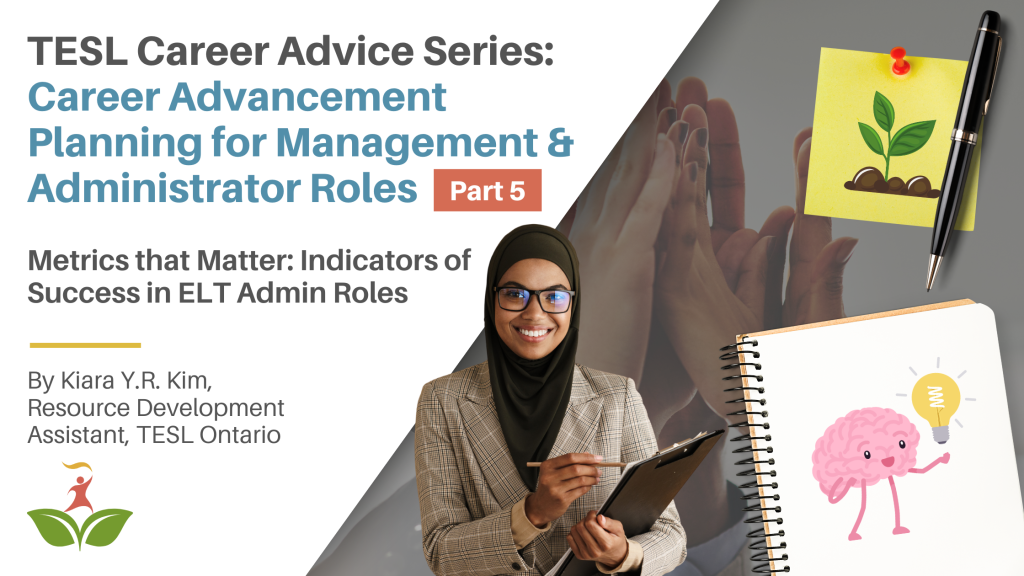By Kiara Y.R. Kim, Resource Development Assistant
Administrative roles are important in the overall management, functioning, and strategic direction of educational institutions. These roles can encompass a wide range of responsibilities that may involve overseeing operations, implementing policies, or managing resources to ensure the overall success of the educational programs and institutions.
Whether you are an educator seeking to broaden your impact on a larger scale, drawn to leadership and mentorship for educators, or motivated for professional growth, embarking on the path from educator to administrator is a journey that demands both ambition and strategic navigation.
In this unique blog series, we explore the pursuit of administrative roles in the field of English Language Training (ELT). TESL Ontario collaborated with six (6) hiring managers representing various sectors of the Ontario ELT landscape, who stand ready to share their experience, advice, and wisdom along this transitional journey. This fifth and final installment of the series is designed to shed light on key performance measures that contribute to excellence in the field.
Seven Key Performance Measures in ELT Administration
1: Time management and Organization: The administration environment often has multiple and overlapping deadlines and demands, and so an efficient ELT administrator is able to work on multiple projects while meeting budget constraints, timelines, and quality work. Being able to juggle several tasks at once ensures that each project is receiving attention, contributing to overall productivity of the program.
2: Financial Literacy & Strategic Thinking: Navigating budget and financial strategy is an important aspect of administration. Being able to understand financial aspects of the program by managing budgets, allocating resources, and making informed decisions and projections contributes to the overall growth and sustainability of the program.
3: Understanding of the Industry: A genuine interest in education, language training, and awareness of emerging trends such as relevant criteria, learner audiences and needs, teaching methodology, assessment frameworks (ie., PBLA, CLB) allow administrators to align their efforts with the institution’s goals. In doing so, they are receptive to new initiatives, innovation, and contribute to the growth and enhancement of quality education.
4: Dedication to Educator Growth: Administrators who offer and show interest in professional development by engaging in self-assessment, evaluation processes, support and mentorship programs contribute to the development of a dynamic, continuously growing organizational environment where educators feel supported, valued, and motivated to excel.
5: Leadership, Integrity, Accountability: A significant amount of trust in employee wellbeing and organizational health is passed to managers, coordinators, and supervisors. A demonstrated ability to take responsibility and accountability for one’s work, as well as commitment to see their own personal and professional growth are crucial to fostering a culture of transparency, trust, and continuous improvement.
“Managers need to champion their programs, their organization and be good [at] promoting inside and outside the organization.“ Manager, Continuing & Community Education
6: Communication: Administrators often meet with people within and outside of the team, including students, staff, funders, collaborators or colleagues from other organizations, each of whom may have conflicting needs and perspectives. Clear and open communication, professionalism, and general people skills are critical among administrators to foster collaboration in order to work towards shared goals.
“Communication is critically important to the role, particularly the use of diplomacy in both oral and written communication. The ability to deliver both good and bad news while still keeping the team together is important. Likewise, the ability to work closely with a variety of others is important to get along. Managers often meet people from within the team or others at the college and university. Sometimes these perspectives can be at odds with your own, so you need to know how to work with people to achieve goals.” Department Chair
“Good listening skills are key and to stay inspired by ESL work.” Associate Chair
7: Flexibility & Adaptability: These skills allow administrators to navigate the ever-evolving ELT landscape, as well as the changing perspectives and demands of people they work with. Being receptive to new ideas and strategies can allow administrators to overcome challenges.
“Nothing ever goes according to plan, so being able to pivot or adjust is critical to finding success.” Department Chair
“Flexibility and patience (with self and others).” ESL-LINC Coordinator
Excelling in ELT administrative roles requires a wide skillset that encompasses several aspects of the program. Hopefully, these key performance measures can help you to navigate the complex role of shaping language education.
The Career Connections: 2023 Career Fair and the Career Booster forum took place as part of the 2023 TESL Ontario Annual Virtual Conference that was held on November 9th. While you may have missed it this year, please consider joining us next year for our TESL Ontario Annual Conference and Career Fair.
Kiara Kim is the Resource Development Assistant at TESL Ontario for summer 2023. She is a recent graduate from the University of Toronto, Mississauga, with an HBSc in Anthropology. Throughout her undergrad, she worked actively within university programming and various community research projects in fields of anthropology of health, historical archeology and English language education. She is looking forward to furthering her intersecting interests in research and education.



Submit a Comment